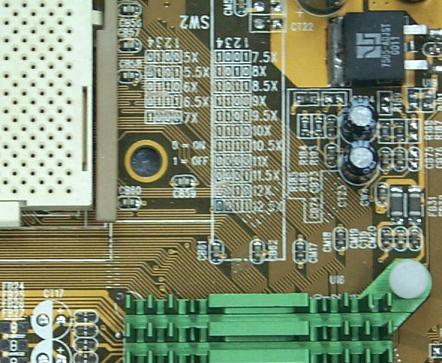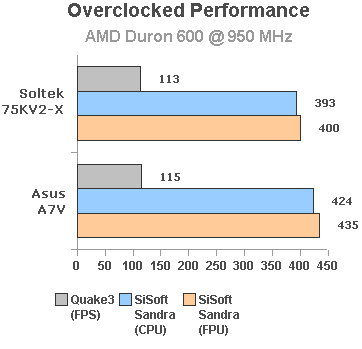The biggest
attraction of the 75KV2 X with respect to overclocking potential is the presence
of an on board multiplier adjustment. As we have seen time and again,
overclocking simply on the FSB alone is something which will not yield
tremendous results. This holds especially true on the 200MHz DDR bus.
Instability occurs as a result of an increased amount of "noise" associated with
sending data over the effectively doubled bus in Athlon's Duron and
"Thunderbird" chips. So in order totally eliminate the "hazards" associated with
FSB overclocking, multiplier adjustments certainly fit the
bill.
Nevertheless, the FSB is still a vital ingredient for overclockers
and when used with multiplier adjustments simultaneously, the FSB adjustment can
be generally used as a "fine tuning" setting. With respect to FSB options, the
following was taken from the Soltek 75KV review as it remains identical to the
motherboard in this review...
"With respect to overclocking, the
SL 75KV comes packed with a number of options to assist the user. Available
front side bus (FSB) speeds on this motherboard range from 100MHz 150MHz which
can either be modifying from within the system BIOS or through the use of its on
board DIP switch box. Specifically, the SL 75KV supports the following FSBs:
100, 103, 110, 112, 115, 120, 124, 133, 140 and 150MHz. These speeds are
selectable either through the DIP switches or BIOS through the Frequency/Voltage
Control option. However, for all practical purposes the SL 75KV does support
increases of FSB speed in very small steps of 1MHz. This is
done by first setting a FSB speed through whichever means available. Then, two
options known as "Method in Linear Function" and "CPU Host by Linear Function" allow the
user to either add or subtract a value between 0 28MHz to/from the already set
FSB speed."

Another attraction for
overclockers is the option to manipulate core voltage value of the CPU. Starting
from 1.50V, the SL 75KV allows Vcore to go as high as 1.85V in 0.025V
increments. And of course, an option to boost the memory bus by 33MHz (over FSB)
is available."
In case you require it, Soltek have silk screened a table on the motherboard
providing simple diagrams indicating multiplier settings and their corresponding
DIP switch configuration... And here is a shot of the DIP switches along with
the LED indicator...
So how did the
75KV2 X perform on our overclocking tests? In a word, outstanding! On a
similarly configured system using an Asus A7V, the maximum achievable overclock
reached was 950MHz with a stable running system and at 962MHz, our test bed
would only be able to POST up and subsequently "hang". On the 75KV2 X, we were
able to run the system at an astounding 974MHz (stable) and were able to touch the 1GHz
barrier, albeit with the similar occuring that the A7V had at 962MHz that is, it
would POST and lock up. Naturally, we were certainly pleased at what the 75KV2 X
was able to accomplish. For comparative purposes, we took the scores of both
motherboards running at a speed of 950MHz to provide a better idea of how
exactly how fast the 75KV2 X performs under real world conditions...

Though
the Soltek board was able to achieve higher numbers from the overclock, the Asus
A7V still has a slight edge in terms of sheer performance on a clock for clock
comparison. However, do keep in mind that these differences are marginal. With
motherboards based upon the KT133 platform, board makers have had time to mature
to products with respect to overall board design, optimizing data paths, BIOS
code, etc. This being the case, the general rule of thumb is that performance
figures may vary just a bit, but not enough to significantly impact overall
system performance.
Stability, on the other hand, is a characteristic
that needs added attention from board makers. And fortunately, the 75KV2 X comes
out with flying colors. During our torture tests, the Soltek platform was able
to withstand various resource demanding applications without a single crash.
This certainly did not come as a surprise as every other Soltek board that we
have reviewed has performed flawlessly.
Conclusions
The 75KV2 X does
just fine under business, content creation and gaming applications. As we saw,
the Soltek motherboard's performance is extremely close to that of the
Asus A7V. With AGP Pro, ATA/100, multiplier adjustments and VD Tech there isn't
much that the 75KV2 X lacks feature wise. The only major feature that it doesn't
have is RAID functionality. However, adding RAID would certainly boost up the
retail cost of the board. Not to mention that Soltek has yet to venture into
such territory.
Soltek's Socket A platform is extremely stable and it
overclocks like a dream. The simple fact that it outclocked an A7V should speak
volumes of the talent of Soltek engineering.
The addition of 2 extra USB
ports, another rarity among Socket A boards, adds a good amount of flexibility
to the end user. The lack of an AMR slot an the addition of a single ISA slot
makes this accommodation more feasible as AMR just has yet to click.
When
we reviewed the 75KV, our only wish was that board would have a provision for
multiplier adjustments. Now that Soltek has made the addition, there isn't
anything at all that we can complain about. Whether it be for gamers,
overclockers or even server usage, the Soltek 75KV2 X easily meets the
requirements to be placed in any of those genres. As usual, we have come across
a very fine product from Soltek and cannot wait to see what they have in store
in the
future.
